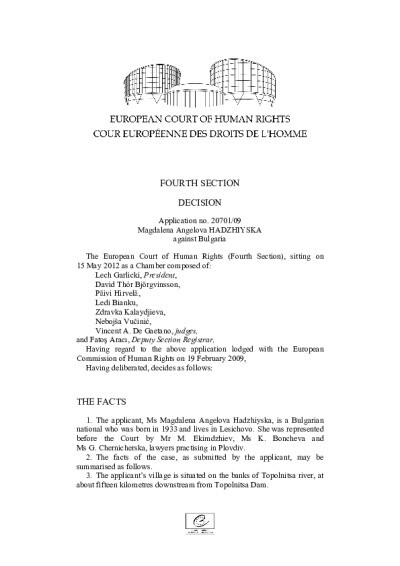
Date
Geographical Area
Europe
Countries
Bulgaria
Keywords
Jurisdiction
European Court of Human Rights (ECHR)
Case Name
Hadzhiyska v Bulgaria
Case Reference
Application no. 20701/09
Name of Court
European Court of Human Rights
Key Facts
The applicant brought a claim for damages against the Ministry of Environment and Waters and the Governor of Pazardzhik Region. The applicant’s village was situated on the banks of the Topolnitsa river and on 5 and 6 August 2006, the river broke its banks destroying the applicant’s property.
She alleged that the defendants had failed to clean the riverbed and had failed to install any protective facilities to protect her village and the local people, and so were in breach of the Waters Act 1999. The Pazardzhik Administrative Courts dismissed the applicant’s claim stating that the omissions of the authorities did not form part of their administrative duties.
The applicant alleged that the defendant had breached Article 1, Protocol No.1 (protection of property) ECHR since the damage to her house had been a direct result of the authorities’ failure to take measures to prevent floods and also that the defendant had breached Article 6(1) ECHR (right to a fair hearing) as she had not had effective access to the Courts. The applicant also complained under Article 13 (right to an effective remedy).
She alleged that the defendants had failed to clean the riverbed and had failed to install any protective facilities to protect her village and the local people, and so were in breach of the Waters Act 1999. The Pazardzhik Administrative Courts dismissed the applicant’s claim stating that the omissions of the authorities did not form part of their administrative duties.
The applicant alleged that the defendant had breached Article 1, Protocol No.1 (protection of property) ECHR since the damage to her house had been a direct result of the authorities’ failure to take measures to prevent floods and also that the defendant had breached Article 6(1) ECHR (right to a fair hearing) as she had not had effective access to the Courts. The applicant also complained under Article 13 (right to an effective remedy).
Decision and Reasoning
The Court concluded that the applicant had failed to make an arguable claim under Article 1, Protocol No.1. The Court examined the extent to which the authorities were under an obligation to protect the applicant’s property from damage, and held that a distinction needs to be drawn between positive obligations under Article 2 ECHR and those under Article 1, Protocol No.1. The Court noted that the obligation to protect the right to the peaceful enjoyment of possessions is not absolute. The Court noted that natural disasters, such as heavy rainfall, do not call for the same extent of involvement by the State as compared to dangerous activities which are human-made.
The Court distinguished this case from Öneryildiz v. Turkey and Kolyadenko & others v. Russia. The Court noted that it remains unclear whether protection facilities could have prevented the damage caused by the flood, and concluded that no causal link had been established between any acts or omissions by the authorities and the damage which was done to her property. The Court also held that there was no violation of Article 6(1) or Article 13 of the Convention.
The Court distinguished this case from Öneryildiz v. Turkey and Kolyadenko & others v. Russia. The Court noted that it remains unclear whether protection facilities could have prevented the damage caused by the flood, and concluded that no causal link had been established between any acts or omissions by the authorities and the damage which was done to her property. The Court also held that there was no violation of Article 6(1) or Article 13 of the Convention.
Outcome
The Court unanimously declared the application inadmissible.
Link
Disclaimer
This case law summary was developed as part of the Disaster Law Database (DISLAW) project, and is not an official record of the case.
Document
Document